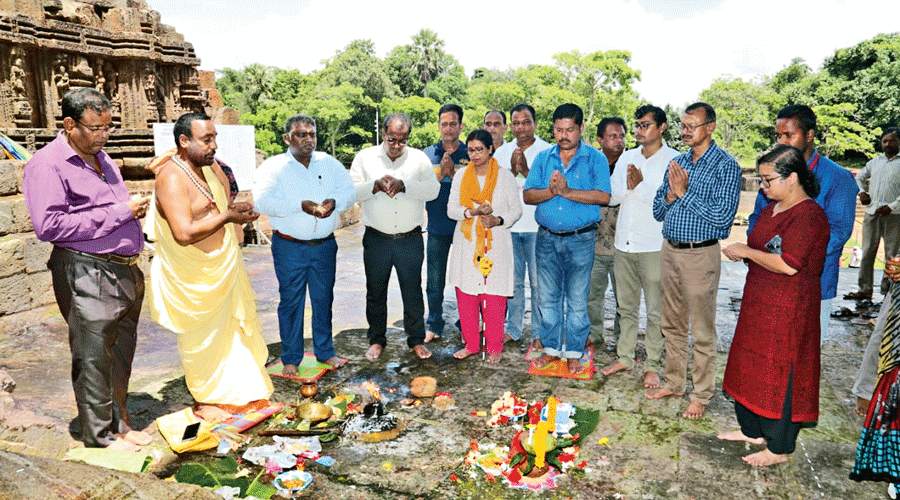The Archaeological Survey of India (ASI) on Thursday began the process to remove the sand stuffed inside the Jagamohan of the 13th century Sun Temple at Konark.
The interior of the Jagamohan was filled up with river sand 119 years ago by the Britishers to check the collapse of the structure. The ground-breaking ceremony to remove sand from inside the Sun Temple, the classic illustration of the Odisha style of architecture or Kalingan architecture, was held inside its premises.
Sun Temple, the only Unesco heritage site of Odisha, had a main sanctum santorum (viman), which fell in 1837. The main mandap-audience hall (Jagamohan), which is about 128 feet tall, still stands and is the principal structure in the surviving ruins.

The ground-breaking ceremony on the temple premises. Sarat Kumar Patra
ASI, Odisha circle chief Arun Mallik told The Telegraph, “The interior of the Jagamohan of the Sun Temple was filled up with river sand in 1903 to check further collapse of the structure which was in a dilapidated condition. Now the project is being executed after the approval of the Director General of ASI. For the successful execution of work, IIT, Madras, and engineers of the state have been involved. We have taken their advice to face the challenging task of removing the sand from Jagamohan. We have done the detailed documentation”
He said: “The edifice of the 13th century as it now has been studied by the experts so far as internal geometry, structural condition and the foundation with the help of the modern technical devices. Moreover, the opinion has also been obtained from experts including archaeologists, engineers, and architects through seminars regarding the removal of sand from the inner side of the Jagamohan.”
According to the ASI sand inside the Jagamohan is filled up to a height of 19.8 metres. “It has already settled. There is a gap of 5.8 metres. We will remove the sand from the western side. We are now raising a mechanism platform for this,” said officials.
Malik said: “Once the sand is removed completely, structural repair of vulnerable portions would begin. The repair work can also go simultaneously. After completion of the work, the visitors coming from across the globe to see the beauty of the black pagoda will have a glance of the temple — a world heritage site.”
The Central Building Research Institute (CBRI) had also suggested the removal of the sand from inside the sanctum sanctorum of the temple.
The ASI has awarded work to a private company but it would work under its supervision. “Though we have set a target to complete the evacuation of sand in three years, it can be completed early too.”
The ASI would take nearly three years to remove the sands from the inner sanctum sanctorum of the Jagamohan.
In fact, the idea was floated in February 2020 at the end of a two-day national conference on the conservation of the Sun Temple. Then Union culture minister Prahlad Singh Patel had asked the ASI to prepare a detailed report on the modalities of removing the sand. Accordingly, the ASI submitted a report after due consultation with stakeholders.
Indian National Trust for Art and Cultural Heritage (INTACH)’s Anil Dhir described it as a welcome move. “In 1903 then British engineers filled sand to save the structure. Earlier an endoscopy was done to know the status of Jagamohan interior. The sand has already subsided and pushing the side walls. Once the sand is removed we have to put a steel structure to save the edifice from collapsing,” said Dhir.











